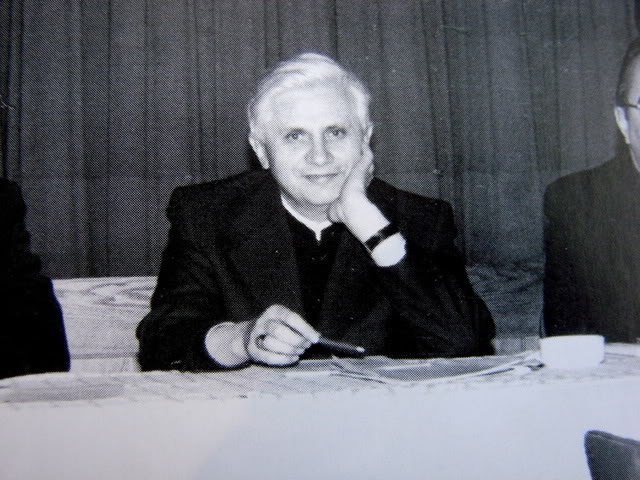
The attack on Ratzinger and his Prophecy from 1969 about a “Church of Faith” and a “little flock of believers”
from The Wanderer
Last week we witnessed the trial for the stoning of Pope Benedict XVI, not only on the part of the media, but also, and this is the most sad aspect, on the part of the German bishops, with the consent of the Vatican and the silence of the overwhelming majority of the world’s bishops. They have never forgiven the fact that he, the most brilliant theologian that Germany gave the 20th century, was a conservative, criticized the liturgical reform and was a pious man who believed the Catholic faith. They would have preferred Rahner, Küng, or Lehmann, but the one who shone the most brilliantly was Ratzinger, and now that he is old and sick they are making him pay. A good summary of what happened is in this report by Father Santiago Martín.
What has powerfully captured my intention is the particular virulence of the press against Pope Benedict, from Google, which no longer calls him “pope emeritus” but rather “ex-pope,” to the presumably more serious television networks. A good example may be seen in this brief report prepared by Deutsche Welle. Perhaps I am only imagining this, but the hatred that is behind this is not human; it is a deeper and more ancestral hatred. In a blatant way, these representatives of Mordor are placing themselves at the service of Cardinal Marx – who is like a new Saruman – who demands a profound change in the structures of the Church, a change against which Benedict XVI – like another Gandalf – despite his advanced years still stands as the principal dam of containment.
I have the impression that we are on the eve of a very strong persecution of the Church, in which her institutions will suffer greatly, and many of then will surely disappear. The Church as an institution, as we have known her and as she has existed for much more than a millennium, is in the process of dissolution, and it will not be long before she is reduced to almost nothing. Certainly the Church will remain as the Mystical Body of Christ; believers will also remain who will succeed in maintaining the faith and who will never want to see their hope destroyed by those whose had a duty to nourish it.
It is appropriate to return to the prophecy given in 1969 in five radio lectures by Dr. Joseph Ratzinger, professor at the University of Ratisbon, the city in which he and all his enemies believed that he would end his days:
We have no need of a Church that celebrates the cult of action in political prayers. It is utterly superfluous. Therefore, it will destroy itself. What will remain is the Church of Jesus Christ, the Church that believes in the God who has become man and promises us life beyond death. The kind of priest who is no more than a social worker can be replaced by the psychotherapist and other specialists; but the priest who is no specialist, who does not stand on the [sidelines], watching the game, giving official advice, but in the name of God places himself at the disposal of man, who is beside them in their sorrows, in their joys, in their hope and in their fear, such a priest will certainly be needed in the future.
Let us go a step farther. From the crisis of today the Church of tomorrow will emerge — a Church that has lost much. She will become small and will have to start afresh more or less from the beginning. She will no longer be able to inhabit many of the edifices she built in prosperity. As the number of her adherents diminishes, so it will lose many of her social privileges. In contrast to an earlier age, it will be seen much more as a voluntary society, entered only by free decision. As a small society, it will make much bigger demands on the initiative of her individual members. Undoubtedly it will discover new forms of ministry and will ordain to the priesthood approved Christians who pursue some profession. In many smaller congregations or in self-contained social groups, pastoral care will normally be provided in this fashion. Along-side this, the full-time ministry of the priesthood will be indispensable as formerly. But in all of the changes at which one might guess, the Church will find her essence afresh and with full conviction in that which was always at her center: faith in the triune God, in Jesus Christ, the Son of God made man, in the presence of the Spirit until the end of the world. In faith and prayer she will again recognize the sacraments as the worship of God and not as a subject for liturgical scholarship.
The Church will be a more spiritual Church, not presuming upon a political mandate, flirting as little with the Left as with the Right. It will be hard going for the Church, for the process of crystallization and clarification will cost her much valuable energy. It will make her poor and cause her to become the Church of the meek. The process will be all the more arduous, for sectarian narrow-mindedness as well as pompous self-will will have to be shed. One may predict that all of this will take time. The process will be long and wearisome as was the road from the false progressivism on the eve of the French Revolution — when a bishop might be thought smart if he made fun of dogmas and even insinuated that the existence of God was by no means certain — to the renewal of the nineteenth century. But when the trial of this sifting is past, a great power will flow from a more spiritualized and simplified Church. Men in a totally planned world will find themselves unspeakably lonely. If they have completely lost sight of God, they will feel the whole horror of their poverty. Then they will discover the little flock of believers as something wholly new. They will discover it as a hope that is meant for them, an answer for which they have always been searching in secret.
And so it seems certain to me that the Church is facing very hard times. The real crisis has scarcely begun. We will have to count on terrific upheavals. But I am equally certain about what will remain at the end: not the Church of the political cult, which is dead already, but the Church of faith. It may well no longer be the dominant social power to the extent that she was until recently; but it will enjoy a fresh blossoming and be seen as man’s home, where he will find life and hope beyond death.
Joseph Ratzinger, Glaube und Zukunft, Kösel-Verlag, 1970.



